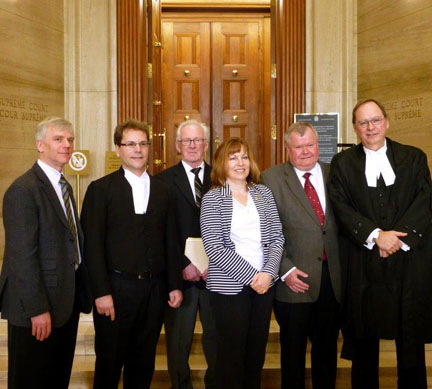After 17 years and a bizarre series of events including a former judge representing the defendant, pension money originally belonging to 7,000 employees of Manitoba Telecom Services has been ordered returned to its rightful owners.

The Supreme Court of Canada in
Telecommunications Employees Association of Manitoba v. Manitoba Telecom Services Inc. recently upheld a lower court ruling that a pension surplus of $43.3-million that existed when the former Manitoba Telephone System was privatized in 1997 belonged to MTS workers and retirees and must be repaid.
The high court reinstated the decision of the trial judge, who had ordered the parties negotiate utilization of the funds and arrive at a mutually agreeable implementation process or submit further evidence so the court could make that determination.
Since 1999, Kris Saxberg and Brian Meronek, partners with D’Arcy & Deacon LLP in Winnipeg represented the plaintiffs — three unions and the retirees of MTS including Unifor (formerly the Communications, Energy and Paperworkers union Local 7), the Telecommunication Employees Association of Manitoba Inc., and the International Brotherhood of Electrical Workers.
The decision means the employees get the $43.3 million plus interest at the plan rate of return, which has been about seven per cent over the last 15 years. The present estimate of the amount is between $134 and $140 million.
When the privatization happened MTS had its own pension reserve set up (the government did not contribute to the old plan) but Crown corporations were socking away money to be prudent in their own pension reserves — that pension reserve of about $375 million was allowed to be counted as a pension contribution on the first day of the company, which meant MTS was tax free for three years after the privatization, explains Saxberg.
“That led them to declare some really nice profits, which affected their share values,” he told Legal Feeds. “They got a lot out of this and while this payment back seems like a lot, it really isn’t.”
Also complicating the case was a move by MTS in 2010 when at the Court of Appeal trial it replaced its trial counsel with a new firm and hired former Court of Appeal judge Charles Huband of Taylor McCaffrey LLP.
Three years before, Huband had retired from the Court of Appeal after 28 years. In Manitoba, the law society allows for retired judges to practise and appear in court after three years whereas in Ontario there has to be special consent.
“That was a huge concern to the plaintiffs and retirees — that a Court of Appeal judge would be arguing the biggest case in Manitoba in front of former colleagues,” says Saxberg.
The appeal court said it would ensure the three judges on the panel would be judges who hadn’t sat with Huband at any point. But that proved to be tricky as well. A week before the hearing was to begin Saxberg learned one of the judges used to sit on the board of MTS, the second judge was a close friend of Huband and the third — Richard Chartier — now the Chief Justice of the Court of Appeal of Manitoba — had sat with Huband for about six months but had forgotten about it.
“They dropped this on us before the appeal,” says Saxberg. “But we were very confident we were going to win and the case is so old and so many retirees had passed away so felt it had to go forward.”
So the court “plugged its nose” says Saxberg and went ahead allowing Huband to argue for MTS.
Saxberg says the Court of Appeal “hammered” them and delivered a “complete and utter reversal” thus leading to the SCC appeal which included the question about Huband representing MTS.

 The Supreme Court of Canada in Telecommunications Employees Association of Manitoba v. Manitoba Telecom Services Inc. recently upheld a lower court ruling that a pension surplus of $43.3-million that existed when the former Manitoba Telephone System was privatized in 1997 belonged to MTS workers and retirees and must be repaid.
The Supreme Court of Canada in Telecommunications Employees Association of Manitoba v. Manitoba Telecom Services Inc. recently upheld a lower court ruling that a pension surplus of $43.3-million that existed when the former Manitoba Telephone System was privatized in 1997 belonged to MTS workers and retirees and must be repaid.